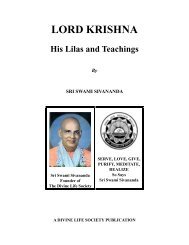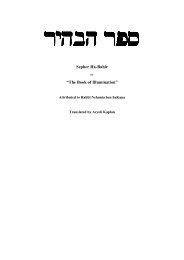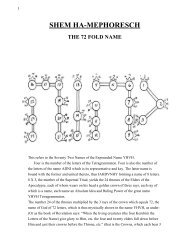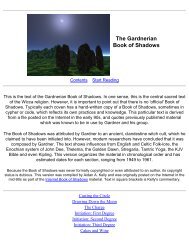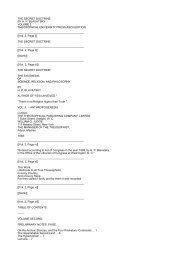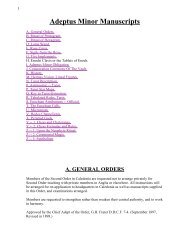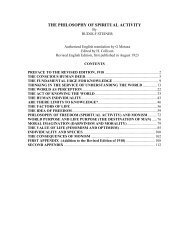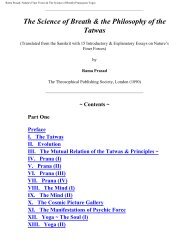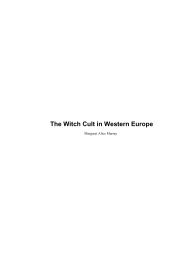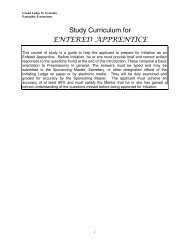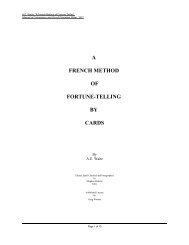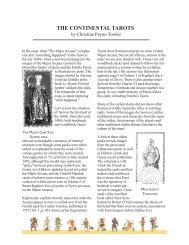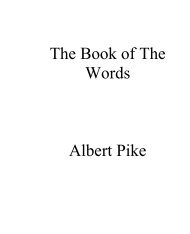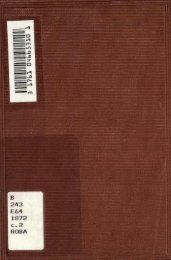Create successful ePaper yourself
Turn your PDF publications into a flip-book with our unique Google optimized e-Paper software.
The Doctrine Of Eternal Life.<br />
for Unas and hath driven <strong>the</strong>m unto him; and <strong>the</strong> cord-master hath bound <strong>the</strong>m for slaughter. Khonsu <strong>the</strong><br />
slayer <strong>of</strong> [his] lords hath cut <strong>the</strong>ir throats (511) and drawn out <strong>the</strong>ir inward parts, for it was he whom<br />
Unas sent to drive <strong>the</strong>m in; and Shesem hath cut <strong>the</strong>m in pieces and boiled <strong>the</strong>ir members in his blazing<br />
caldrons. (512) Unas hath eaten <strong>the</strong>ir magical powers, and he hath swallowed <strong>the</strong>ir spirits; <strong>the</strong> great ones<br />
among <strong>the</strong>m serve for his meal at daybreak, <strong>the</strong> lesser serve for his meal at eventide, and <strong>the</strong> least among<br />
<strong>the</strong>m serve for his meal in <strong>the</strong> night. (513) The old gods and <strong>the</strong> old goddesses become fuel for his<br />
furnace. The mighty ones in heaven shoot out fire under <strong>the</strong> caldrons which are heaped up with <strong>the</strong><br />
haunches <strong>of</strong> <strong>the</strong> firstborn; and he that maketh those who live (514) in heaven to revolve round Unas hath<br />
shot into <strong>the</strong> caldrons <strong>the</strong> haunches <strong>of</strong> <strong>the</strong>ir women; he hath gone round about <strong>the</strong> two heavens in <strong>the</strong>ir<br />
entirety, and he hath gone round about <strong>the</strong> two banks <strong>of</strong> <strong>the</strong> celestial Nile. Unas is <strong>the</strong> great Form, <strong>the</strong><br />
Form (515) <strong>of</strong> forms, and Unas is <strong>the</strong> chief <strong>of</strong> <strong>the</strong> gods in visible forms. Whatever he hath found upon his<br />
path he hath eaten forthwith, and <strong>the</strong> magical might <strong>of</strong> Unas is before that <strong>of</strong> all <strong>the</strong> (516) sahu who<br />
dwell in <strong>the</strong> horizon. Unas is <strong>the</strong> firstborn <strong>of</strong> <strong>the</strong> first born. Unas hath gone round thousands and he hath<br />
<strong>of</strong>fered oblations unto hundreds; he hath manifested his might as <strong>the</strong> Great Form through Sah (Orion)<br />
[who is greater] than (517) <strong>the</strong> gods. Unas repeateth his rising in heaven and he is <strong>the</strong> crown <strong>of</strong> <strong>the</strong> lord<br />
<strong>of</strong> <strong>the</strong> horizon. He hath reckoned up <strong>the</strong> bandlets and <strong>the</strong> arm-rings, he hath taken possession <strong>of</strong> <strong>the</strong><br />
hearts <strong>of</strong> <strong>the</strong> gods (518). Unas hath eaten <strong>the</strong> red crown, and he hath swallowed <strong>the</strong> white crown; <strong>the</strong><br />
food <strong>of</strong> Unas is <strong>the</strong> inward parts, and his meat is those who live upon (519) magical charms in <strong>the</strong>ir<br />
hearts. Behold, Unas eateth <strong>of</strong> that which <strong>the</strong> red crown sendeth forth, he increaseth, and <strong>the</strong> magical<br />
charms <strong>of</strong> <strong>the</strong> gods are in his belly; (520) that which belongeth to him is not turned back from him. Unas<br />
hath eaten <strong>the</strong> whole <strong>of</strong> <strong>the</strong> knowledge <strong>of</strong> every god, and <strong>the</strong> period <strong>of</strong> his life is eternity, and <strong>the</strong> duration<br />
<strong>of</strong> his existence is (521) everlastingness, in whatsoever he wisheth to take; whatsoever form he hateth he<br />
shall not labour in in <strong>the</strong> horizon for ever and ever and ever. The soul <strong>of</strong> <strong>the</strong> gods is in Unas, <strong>the</strong>ir spirits<br />
are with (522) Unas, and <strong>the</strong> <strong>of</strong>ferings made unto him are more than those made unto <strong>the</strong> gods. The fire<br />
<strong>of</strong> Unas (523) is in <strong>the</strong>ir bones, for <strong>the</strong>ir soul is with Unas, and <strong>the</strong>ir shades are with those who belong<br />
unto <strong>the</strong>m. (524) Unas hath been with <strong>the</strong> two hidden (?) Kha (?) gods who are without power (?) . . . . . .<br />
. . (525); <strong>the</strong> seat <strong>of</strong> <strong>the</strong> heart <strong>of</strong> Unas is among those who live upon this earth for ever and ever and<br />
ever."<br />
{p. lxxxi}<br />
The notion that, by eating <strong>the</strong> flesh, or particularly by drinking <strong>the</strong> blood, <strong>of</strong> ano<strong>the</strong>r living being, a man<br />
absorbs his nature or life into his own, is one which appears among primitive peoples in many forms. It<br />
lies at <strong>the</strong> root <strong>of</strong> <strong>the</strong> widespread practice <strong>of</strong> drinking <strong>the</strong> fresh blood <strong>of</strong> enemies--a practice which was<br />
familiar to certain tribes <strong>of</strong> <strong>the</strong> Arabs before Muhammad, and which tradition still ascribes to <strong>the</strong> wild<br />
race <strong>of</strong> Cahtâm-and also <strong>of</strong> <strong>the</strong> habit practised by many savage huntsmen <strong>of</strong> eating some part (e.g., <strong>the</strong><br />
liver) <strong>of</strong> dangerous carnivora, in order that <strong>the</strong> courage <strong>of</strong> <strong>the</strong> animal may pass into <strong>the</strong>m.[1] The flesh<br />
and blood <strong>of</strong> brave men also are, among semi-savage or savage tribes, eaten and drunk to inspire<br />
courage.[2] But <strong>the</strong> idea <strong>of</strong> hunting, killing, roasting and eating <strong>the</strong> gods as described above is not<br />
apparently common among ancient nations; <strong>the</strong> main object <strong>of</strong> <strong>the</strong> dead king in doing this was to secure<br />
<strong>the</strong> eternal life which was <strong>the</strong> peculiar attribute <strong>of</strong> <strong>the</strong> gods.<br />
[1. Robertson Smith, The Religion <strong>of</strong> <strong>the</strong> Semites, p. 295; Fraser, Golden Bough, vol. ii., p. 86.<br />
2. The Australian blacks kill a man, cut out his caul-fat, and rub <strong>the</strong>mselves with it, "<strong>the</strong> belief being that all <strong>the</strong><br />
qualifications, both physical and mental <strong>of</strong> <strong>the</strong> previous owner <strong>of</strong> <strong>the</strong> fat, were communicated to him who used it"; see<br />
Fraser, Golden Bough, vol. ii., p. 88.]<br />
http://www.sacred-texts.com/egy/ebod/ebod05.htm (20 <strong>of</strong> 21) [8/10/2001 11:23:22 AM]



